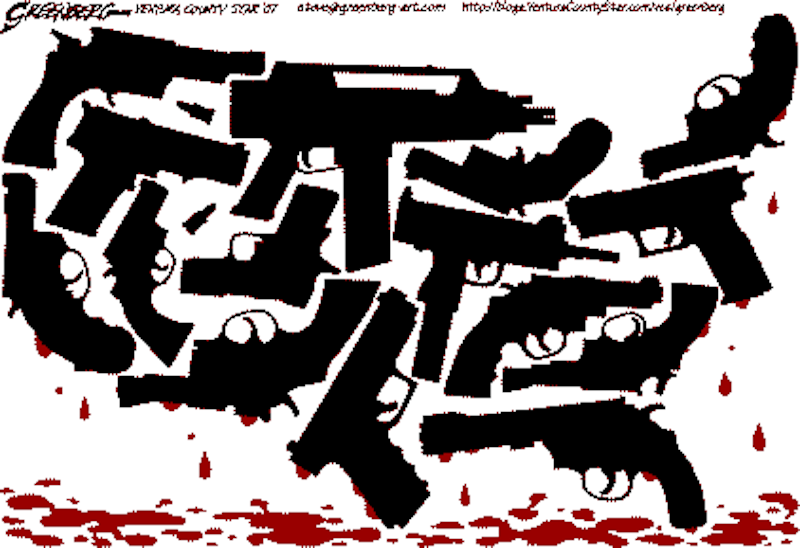If you want a glimpse into the sorry state of America's gun policy debate, look at Brian Doherty's smugly incoherent pronouncements over at Reason.
Doherty's main point is in his article's title: tragedy, he insists, shouldn't make policy. The shooting at the Dark Knight showing in Colorado is a random incident without any broader lessons to teach us about guns, or assault weapons, or America. He declares:
Trying to "turn tragedy into politics" feels gross, because the deaths and the grief for the living are real and terrible and demand respect… If I weren't a professional writer about the Second Amendment (in my 2008 book Gun Control on Trial) on record as believing in the right to bear arms, I wouldn't dream of weighing in at all.
Or, to sum up, only people with credentials like Doherty should be allowed to draw conclusions from tragedy, and only as long as those conclusions are that we should dismiss the tragedy from theoretical consideration. Refusing to think about how the tragedy might involve our society or us is, apparently, the best way to show respect for those who have died.
In the real world outside the abstract libertarian compound, tragedies do very often lead to political thinking and political consequences. Sometimes, this has horrible results, as in our decade of foreign policy motivated by 9/11. Sometimes, though, it's necessary and important. Surely it's not disrespectful to suggest making sure nuclear reactors are earthquake proof after the disaster in Japan. To point out that people died because of inadequate safety features or (in, say New Orleans) because of poor policy response, isn't callous. It's acting as if we care about the dead, and about the living. Preventable deaths should be prevented. That's not an insult to anyone's memory; it's simple human decency.
Not in Doherty's world, though. On the contrary, he's so myopically certain of his position that, without irony, he quotes himself blandly dismissing Gabby Giffords' shooting.
Americans understand that even strange people should be able to own weapons, and not just for deer hunting. The very rare crimes of very unusual Americans should not dictate how everyone's right to self-defense is managed, and even in the wake of tragedy that is fortunately unlikely to change.
Doherty apparently hasn’t noticed that putting "very" in front of "rare" and "unusual" is a rhetorical device somewhat undermined by the fact that such events are, at least, frequent enough that he's got a canned spiel to pull out every time they happen. When, I wonder, will he notice this contradiction? The third time he reprints it? The fourth? The 10th?
Doherty is correct that it's politically impossible to change gun laws at the moment, but I don't think that's because Americans have decided en masse that it's a good idea for "strange people" to have unlimited access to semi-automatic weapons. Rather, it's because the NRA and the pro-gun lobby has bludgeoned politicians into submission—and, perhaps most importantly, because the Democrats abandoned the issue. Doherty himself notes that at the beginning of the 1990s, 78 percent of Americans supported stronger gun control laws. Then along came Bill Clinton. Without a political party to lead or make the case for stricter controls—without a party to, for example, point out that perhaps we could stop our regular cycle of tragedies if we made an effort—public opposition to guns has cratered. Doherty sees this as a sign of America's growing wisdom, but it’s just as likely a result of a craven lack of leadership.
That leadership might reappear, though, if people begin to get weary of random yahoos loading up with firepower so they can kill children. That's why Doherty has taken to the Internet again to wave around airy phrases like, "The endless and unmanageable mystery of the individual's power and choice to do evil," as if somehow an evil person's power to do harm is completely unaffected by the availability of machine guns.
Doherty insists there is no connection between violence and gun possession. That assertion is debatable. James Fallows, for example, points out that after a terrible 1996 massacre in Tasmania, "Australia tightened up its gun laws, and there has been nothing remotely comparable in all the years." In the U.S., on the other hand, we’ve apparently decided that it’s better to accept the occasional multiple shooting than it is to reexamine gun policy. That's a political decision. Which is why Doherty is taking the occasion of the tragedy to make his polemical points, and why he will use the next tragedy to do the same, and the next, and the next, and the next, until, at some point, Americans get tired of hearing the same words spoken over yet another grave.
—Read more Noah Berlatsky at hoodedutilitarian.com

